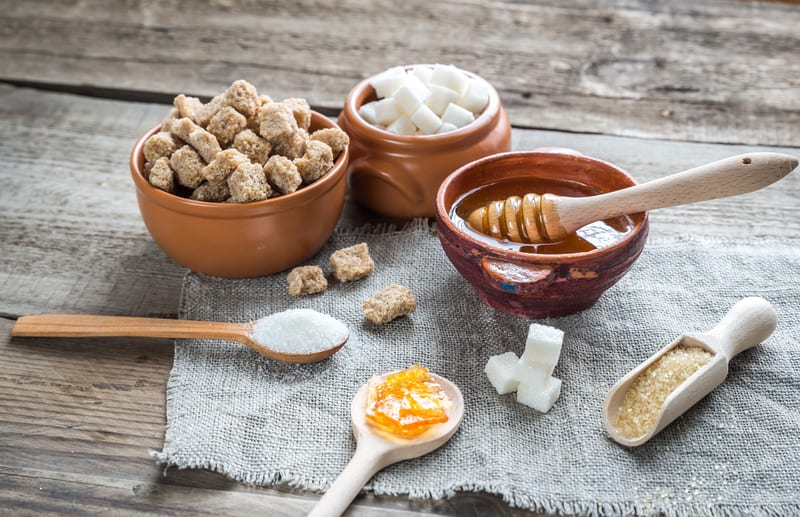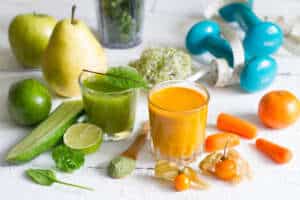Sweeteners – Benefit or Harm?
- By Yelena B
- No Comments
On the path to healthy eating, the first thing people think about is the harmful effects of sugar. Numerous studies show that consuming sugar in large quantities can lead to weight gain, type 2 diabetes, cardiovascular disease and other serious complications.
Food and beverage manufacturers realize that consumers are concerned about sugar, and are increasingly using sugar substitutes with the coveted “sugar-free” labeling. And it’s likely that you’ve already consumed several sugar substitutes without even realizing it.
In the process of losing weight, many people wonder if replacing sugar with low-calorie and calorie-free sweeteners is a healthier alternative to regular sugar? This question has been the subject of ongoing debate and numerous studies over the years.
Main Types of Sweeteners
Let’s review the most common sweeteners of the food industry. It is very important to know about their properties and where they are used, because not all of them are completely safe for consumption, despite the fact that they are authorized for use.
Sugar Alcohols
Sugar alcohols are hybrids of sugar molecules and alcohol molecules. Despite the name, sugar alcohols do not contain alcohol. Some are found naturally in fruits and vegetables. Unlike calorie-free sweeteners, contain calories, but in smaller amounts than simple sugar. In excess can cause digestive upset. The main types of sugar alcohols used in the food industry:
- Erythritol (erythritol) – has 70 percent of the sweetness of sugar and only five percent of the calories. Erythritol has fewer digestive side effects than most other sugar alcohols because it doesn’t reach your large intestine in significant amounts. Most of it is absorbed into the bloodstream and then excreted unchanged from the body..
In February 2023, Nature Medicine published an article describing the link between the sweetener erythritol and an increased risk of heart attack and stroke. The data obtained by medical scientists indicate that erythritol is both associated with the risk of cardiovascular disease and contributes to increased thrombosis.
- Xylitol. The most common sugar alcohol. Most often found in toothpastes, mints, chewing gum. Sweet like regular sugar, but 40% fewer calories. May have a laxative effect when consumed in large quantities.
- Sorbitol. 40% less sweet than sugar. Extends shelf life of foods; causes allergies in some people. Not recommended for people with irritable bowel. Has a weak effect on blood sugar and insulin levels. Used in many foods and beverages.
- Maltilol – contains almost half as many calories as regular sugar. People with diabetes need to be cautious about foods that contain maltilol because it causes blood sugar spikes.
- Glycerin. Widely used in various branches of the food industry as a sweetener, filler, moisture-retaining agent, thickener. It is included in the composition of many products – chocolate, candy, bread, etc.; in pasta products it acts as a glue, binding the components.
- Mannitol – in the food industry, in addition to being a sweetener, it is used as an anti-clumping agent. It is often found in chewing gums. It has a diuretic effect and is not recommended for people with impaired renal excretory function or severe circulatory insufficiency.
- Lactite is a hydrocarbon alcohol synthesized from milk sugar. It is used in sugar-free candies, cookies (cookies), chocolate and ice cream with a sweetness of 30-40% of sucrose sweetness. It has a low energy value of 2 kcal/g. Lactitol enhances protein synthesis by bacteria and inhibits the formation of toxins. It can be found mainly in expensive products, as its production cost is quite high.
Artificial Sweeteners
- Aspartame. Low-calorie, high-intensity sweetener, almost 200 times sweeter than sugar, has almost no calories. Unsuitable for confectionery because it breaks down when heated. Most often used for soft sweet carbonated and non-carbonated beverages.
One of the first synthetic sweeteners and also one of the most debated in the world. For many years, clinical studies have been conducted to prove its harm or safety in use. Thus, in July this year, the World Health Organization (WHO) named the widely used artificial sweetener aspartame as a possible cause of cancer.
- Saccharin. It is a component of many tablet sweeteners, more than 300 times sweeter than sugar. It was once banned in some countries for causing bladder cancer in rats. Today, saccharin is approved by the Joint FAO/WHO Expert Committee, as well as by food agencies in more than 90 countries. JECFA has set the acceptable daily intake of saccharin at 5 mg/kg of human body weight. It is used mainly in the preparation of confectionery, soft drinks, bakery products; creams, desserts; dairy and fermented milk products (yogurt, ice cream, etc.), sauces, chewing gum, cereal products (popcorn, corn sticks, etc.), in the preservation of fruits and vegetables.
- Cyclamate. Used as a sweetener in the food industry: in cakes, pastries, candied fruits and pickles to improve sweetness, can be found in breakfast cereals. Also a fairly widely discussed sugar substitute, whose use is only authorized in about 50 countries worldwide. Cyclamate has been banned in the US, France, the UK and a number of other countries since 1969 due to suspicion of causing kidney failure. In some countries where its use is permitted, cyclamate is contraindicated for use by people with kidney disease and during pregnancy and lactation.
- Sucralose. Sweetness factor 600. Does not affect blood glucose levels and is not involved in carbohydrate metabolism. The maximum allowable daily dose is 18 mg/kg body weight.
The most recent research on sucralose was published in the June 2023 Journal of Toxicology and Environmental Health.
“Researchers have found that sucralose causes DNA damage, which puts people at risk of developing diseases. They also linked sucralose to ‘leaky gut’ syndrome, which means that the gut mucosa breaks down and becomes more permeable”
- Acesulfame potassium. 200 times sweeter than sucrose. It is used in the production of carbonated drinks, dairy products, confectionery, can be found in various canned products – fish, vegetables and fruits, also in sauces, mustard, ketchups and fruit juices. The substance is not absorbed by the body, does not cause tooth decay and does not participate in metabolic processes. As with most sweeteners, the safety of Acesulfame potassium is still a controversial issue.
Natural Sweeteners
- Fructose. A carbohydrate found in berries, fruits, and honey. One-third less caloric than sugar and has less effect on blood glucose levels. Switching to fructose is not guaranteed to reduce the risk of obesity. If fructose is consumed in large quantities by people with magnesium deficiency, it is possible to develop metabolic syndrome with obesity and hypertension.
- Honey. It contains 40% fructose, but also 18 amino acids, vitamins, minerals, iron, zinc, potassium, calcium and vitamins B6, I2 and PP. Honey has antiviral and antibacterial properties.
It is strongly recommended to avoid giving honey – even in small quantities – to children under the age of 1 year. Honey can cause a rare but serious gastrointestinal illness (infant botulism) caused by exposure to Clostridium botulinum spores. The bacteria in the spores can grow and multiply in a child’s intestines, producing a dangerous toxin.
- Yacon and yacon syrup. Contains only a third of the calories of regular sugar, has a very low glycemic index. The syrup contains inulin, which is very beneficial for the intestinal microflora. Yacon reduces appetite. In the industrial industry, most likely, you will not meet it as a food additive, as the product is characterized by a very high cost.
- Stevia is a plant-derived sweetener made by extracting the sweet-tasting steviol glycosides from the plant Stevia rebaudiana. Stevia glycosides are 300 times sweeter than table sugar. It is currently one of the most popular types of sweeteners. Stevia has no calories, does not affect blood sugar or insulin levels, and does not cause tooth decay.
Unfortunately, the food industry uses highly purified stevia extracts, which makes the sweetener less “natural.” In addition, many food manufacturers mix stevia with other sugars or artificial sweeteners to minimize the bitter taste of natural stevia. That’s why it’s important to pay attention to the ingredients on product labels. And if you see that in addition to stevia added components such as dextrose, maltodextrin and sucrose, keep in mind that the product is no longer so low-calorie.
- Agave syrup. This sweetener is rich in inulin, contains many vitamins and minerals in its composition – vitamins A, D, K, E, vitamin B group, iron, magnesium, calcium, selenium, zinc, phosphorus and other useful substances. That said, agave is not a healthy substitute for table sugar. Agave is 25% sweeter than table sugar and should be avoided by people controlling their blood glucose levels.
- Coconut sugar is a fairly caloric sweetener made by evaporating the sap of the coconut tree. Two teaspoons contains 30 calories and 7g of sugar. The glycemic index of coconut sugar is 54. Simply put, coconut sugar is simply more expensive than regular sugar. Minimal nutrients, high cost, small difference in glycemic index compared to regular sugar. Obviously, when choosing a sweetener, it is better to favor the natural sweeteners described above.
Conclusion
Many sugar substitutes advertised as beneficial can have a long list of side effects.
Although some of them contain fewer calories and carbs than regular sugar, their use has been linked to digestive problems, impaired blood sugar control and changes in beneficial gut bacteria.




Leave a reply